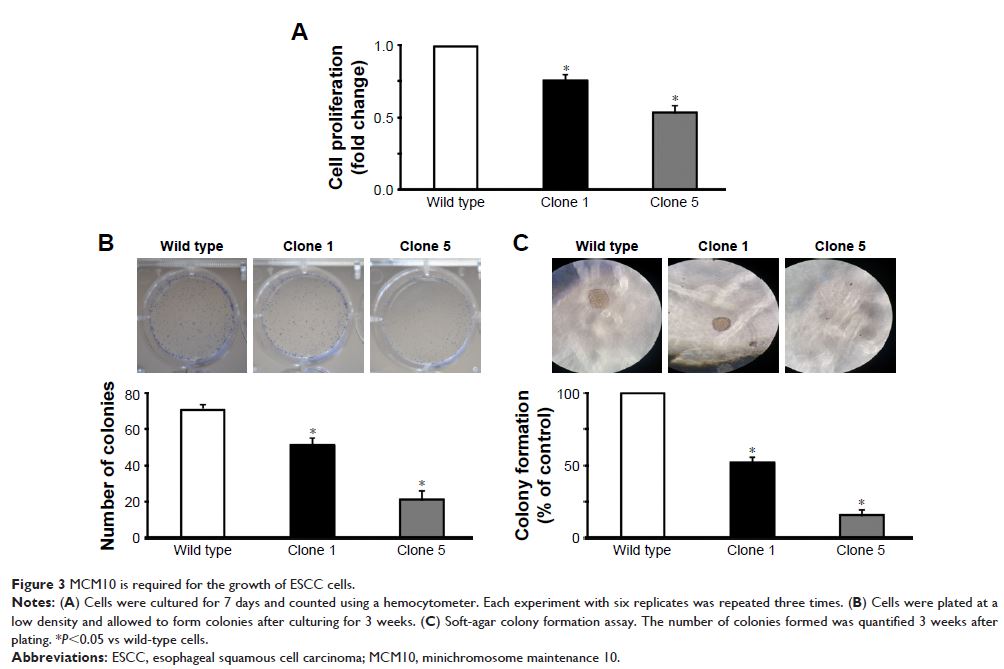108384
论文已发表
注册即可获取德孚的最新动态
IF 收录期刊
- 3.4 Breast Cancer (Dove Med Press)
- 3.2 Clin Epidemiol
- 2.6 Cancer Manag Res
- 2.9 Infect Drug Resist
- 3.7 Clin Interv Aging
- 5.1 Drug Des Dev Ther
- 3.1 Int J Chronic Obstr
- 6.6 Int J Nanomed
- 2.6 Int J Women's Health
- 2.9 Neuropsych Dis Treat
- 2.8 OncoTargets Ther
- 2.0 Patient Prefer Adher
- 2.2 Ther Clin Risk Manag
- 2.5 J Pain Res
- 3.0 Diabet Metab Synd Ob
- 3.2 Psychol Res Behav Ma
- 3.4 Nat Sci Sleep
- 1.8 Pharmgenomics Pers Med
- 2.0 Risk Manag Healthc Policy
- 4.1 J Inflamm Res
- 2.0 Int J Gen Med
- 3.4 J Hepatocell Carcinoma
- 3.0 J Asthma Allergy
- 2.2 Clin Cosmet Investig Dermatol
- 2.4 J Multidiscip Healthc

使用 CRISPR/Cas9 消除 MCM10 可通过抑制 Akt 信号来遏制食管鳞状细胞癌细胞的生长和迁移
Authors Yan J, Du P, Jia Y, Chang Z, Gan S, Xu X, Wang Y, Qin Y, Kan Q
Received 14 November 2017
Accepted for publication 11 April 2018
Published 6 June 2018 Volume 2018:11 Pages 3323—3333
DOI https://doi.org/10.2147/OTT.S157025
Checked for plagiarism Yes
Review by Single-blind
Peer reviewers approved by Dr Cristina Weinberg
Peer reviewer comments 3
Editor who approved publication: Dr Ingrid Espinoza
Introduction: Minichromosome
maintenance 10 (MCM10) is deregulated in several malignancies including
cervical cancer and urothelial carcinoma. However, the expression and biologic
role of MCM10 in esophageal squamous cell carcinoma (ESCC) is still
unknown.
Methods: In this study, we performed immunohistochemistry
and real-time polymerase chain reaction (PCR) analysis to examine the
expression of MCM10 in ESCC and adjacent normal esophageal tissues. The
associations of MCM10 expression with clinicopathologic parameters of ESCC were
analyzed. Ablation of MCM10 through the CRISPR/Cas9 technology was conducted
and its impact on ESCC cell growth and migration was investigated.
Results: The mRNA and protein expression levels of MCM10
were significantly greater in ESCC than in normal tissues (P <0.001). The expression of
MCM10 was significantly associated with age at diagnosis (P =0.033), but not with gender,
differentiation grade, invasion status, or tumor–node–metastasis (TNM) stage.
Knockout of MCM10 significantly suppressed the proliferation, colony formation,
and migration capacity of EC109 ESCC cells, compared to control cells harboring
wild-type MCM10. Mechanistically, MCM10 depletion markedly reduced the
phosphorylation of Akt. Overexpression of constitutively active Akt
significantly restored the aggressive phenotype of MCM10-null EC109
cells.
Conclusion: In conclusion, these results suggest that MCM10
acts as an oncogene in ESCC through activation of Akt signaling and represents
a promising therapeutic target for this malignancy.
Keywords: esophageal
cancer, growth, migration, minichromosome maintenance proteins
